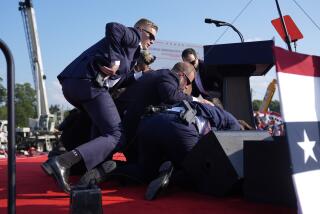Political Excitement Replaces Wartime Tensions of Year Ago
- Share via
WASHINGTON — Last year, with the Persian Gulf War just 13 days old, police threw a massive security net around the Capitol and patriotism filled the air as George Bush, the President and commander-in-chief, delivered his State of the Union message to a series of standing ovations.
Tuesday night, with the war a faded memory, with Bush scrambling to rescue both the economy and his political standing--and with lawmakers in trouble with the voters--the atmosphere was starkly different.
For one thing, with the menace of terrorism significantly reduced, police could relax a bit. In contrast to 1991, they did not bother to check for bombs under every car entering the Capitol grounds and they did not urge lawmakers to take underground tunnels from their offices to the House floor.
Although there was less tension this year outside the brightly illuminated Capitol, the air was supercharged inside. The threat of voter retribution, combined with high expectations set up by the White House for Bush’s remarks, hung palpably over the House chamber.
Soon after he began speaking, the address fell into a partisan affair: a boisterous mix of provocative presidential challenges and dueling bursts of applause, cheers, hisses and laughter from the assembled members of the Senate and House.
The partisan thrusts continued long after the speech was over, as lawmakers filed into the ornate old House chamber, now known as Statuary Hall, to be interviewed by hundreds of newspaper, television and radio reporters.
The scene had the look of a chaotic Middle Eastern bazaar, as senators and House members with their political “spins” on the meaning of the speech sought out, and were sought out by, correspondents from hometown and nationwide outlets.
More to Read
Get the L.A. Times Politics newsletter
Deeply reported insights into legislation, politics and policy from Sacramento, Washington and beyond. In your inbox twice per week.
You may occasionally receive promotional content from the Los Angeles Times.










